The sun used to be a source of trouble for Indian camel herder Bhanwar Raika - but these days it is boosting his income, even as climate change brings ever hotter temperatures.
The pastoralist makes a living selling his herd’s milk but temperatures as high as 52 degrees Celsius (126 degrees Fahrenheit) regularly used to spoil it before he could sell it to the local dairy, about 80km from his home in western India’s Thar Desert.
But the 55-year-old’s fortunes changed last February when a solar-powered refrigeration system - called an instant milk chiller - was installed 2km away from Raika’s Nokh village in Rajasthan state.
This allows Raika to store and transport fresh milk to Bajju Dairy, owned by NGO Urmul Seemant Samiti, which also bought the chiller, and runs it working together with local communities.
As a result, Raika’s monthly income has more than quadrupled over the last year, to about 50,000 rupees ($612).
“The weather is getting hotter in the past few years and it was incredible for me to see that the same sun that would sour litres of my milk so fast could also chill and preserve it with such freshness and purity,” he said.
At least 700 camel herders and their families in Bikaner, Jodhpur and Jaisalmer districts are benefitting from the NGO’s initiative that installed four milk chillers - powered by solar panels - within walking distance of eight villages in the area.
The chillers can store between 500-1,500 litres of milk each, and cost 900,000 rupees ($11,030) for the smaller units and 1.4 million rupees ($17,289) for the largest.
The machines are designed to extend the shelf life of milk by at least three days if it is stored at 4C, and longer if it is frozen.
“This helps the community to earn a fair income and they no longer have to worry about incurring losses due to milk spoilage,” said Motilal Kumawat, project manager for Urmul, which supports rural communities in Rajasthan.
“
It is basically a win–win situation, where the remote rural communities with their growing access to clean energy for livelihood generation are ideally becoming an integral part of India’s march to green energy transition.
Harjeet Singh, head of global political strategy, Climate Action Network International
About 80 per cent of the project’s funding came from groups such as the India-based SELCO Foundation, which promotes energy access, and the World Wildlife Fund (WWF), which is supporting the global transition from fossil fuels to sustainable energy.
The communities that use the chillers also contributed labour and cash to help set up the units, Kumawat added.
Charities and companies nationwide have in recent years set up solar-powered cold storage units for farm produce, providing an alternative to grid-connected systems that are more expensive for farmers to use and must be powered by polluting diesel generators during frequent electricity outages in remote areas.
Projects like Urmul’s are vital to boost India’s shift towards sustainable clean energy systems - and could ultimately help rural communities end their dependence on fossil fuels, said Harjeet Singh of Climate Action Network International.
“It is basically a win–win situation, where the remote rural communities with their growing access to clean energy for livelihood generation are ideally becoming an integral part of India’s march to green energy transition,” said Singh, head of global political strategy for the worldwide coalition of NGOs.
Change for the whole community
Most of India’s camels are in Rajasthan, and represent a key part of the indigenous Raika pastoralists’ cultural identity.
They were widely sold as draught animals until the state in 2014 declared the camel its official animal, introducing measures to protect them and preventing their sale to other states in India - which hit local communities economically.
Herders then started to sell camel milk, which is considered healthier than cow’s milk and used to treat various diseases such as tuberculosis, said Ruparam Raika, an elder from Grandhi village in Bikaner.
This shift has created new jobs, with the solar chillers for instance often maintained and managed by young people.
Each morning, groups of youths take milk-filled steel cans from households to the collection centres, where others - who have received training - test the milk for purity and quality before storing it in the solar-powered chilling units.
“I can tell within minutes if the milk is pure and fresh,” said 22-year-old Prem Raika, who is Bhanwar Raika’s son.
He is one of many young people in Nokh who, despite being educated, have decided to stay at home and work in camel milk production instead of seeking opportunities elsewhere in India.
Besides operating the chillers and collections systems, they also have found work selling products made from camel’s milk - from cheese and butter to biscuits - at shops and online.
On average, young people like Raika earn about 15,000 ($184) rupees monthly, according to Kumawat of Urmul.
Bhanwari Devi Sunthar, village head for Grandhi in Bikaner, said installing instant milk chillers had helped raise the average household incomes to between 40,000-45,000 rupees ($491-$552), up from 10,000–12,000 rupees ($123-147).
“I am happy to see more children go to school and even to college from our households today,” she said, adding that the increased earnings meant some families had been able to buy additional camels and ultimately sell even more milk.








